2025届高考英语专项复习 句子成分和句子种类 课件(共90张PPT)
文档属性
| 名称 | 2025届高考英语专项复习 句子成分和句子种类 课件(共90张PPT) |  | |
| 格式 | pptx | ||
| 文件大小 | 15.4MB | ||
| 资源类型 | 教案 | ||
| 版本资源 | 人教版(2019) | ||
| 科目 | 英语 | ||
| 更新时间 | 2024-09-16 10:15:36 | ||
图片预览

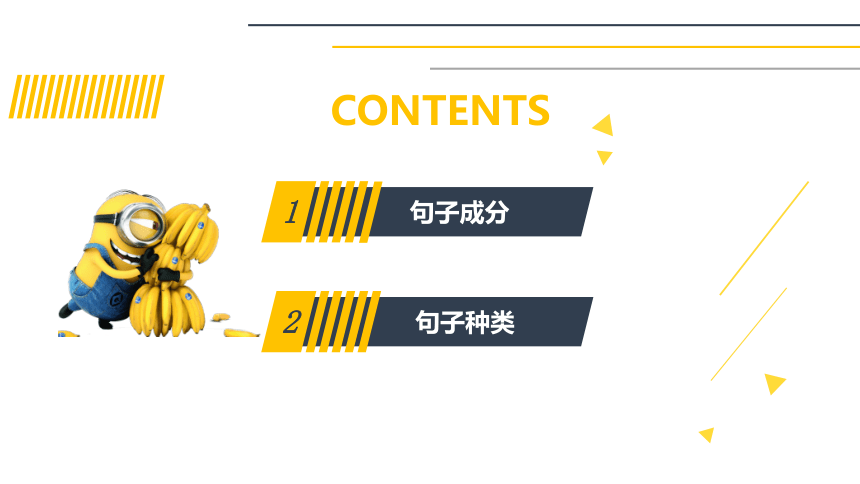
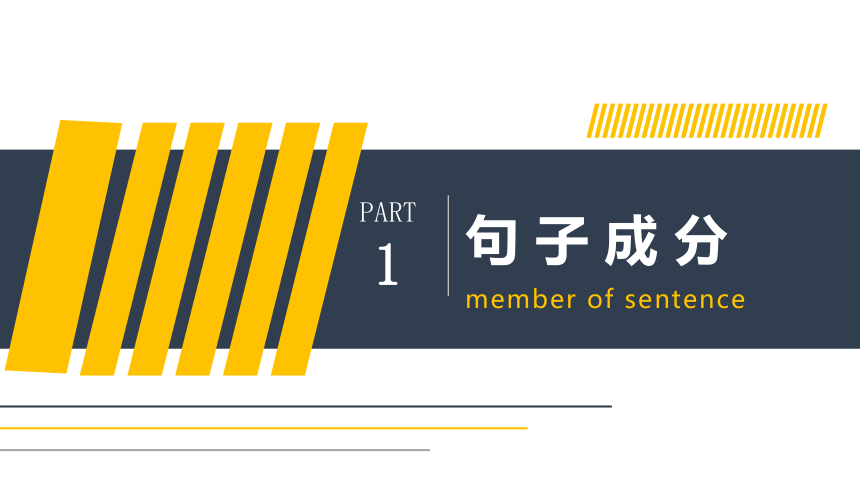
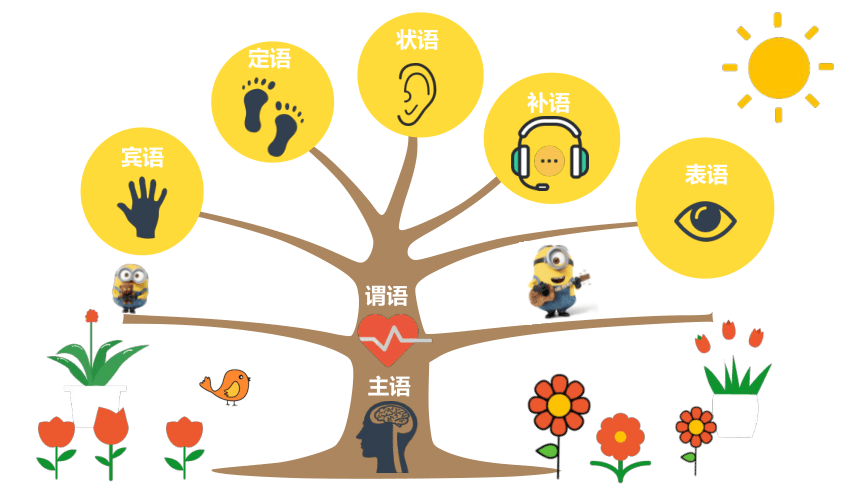

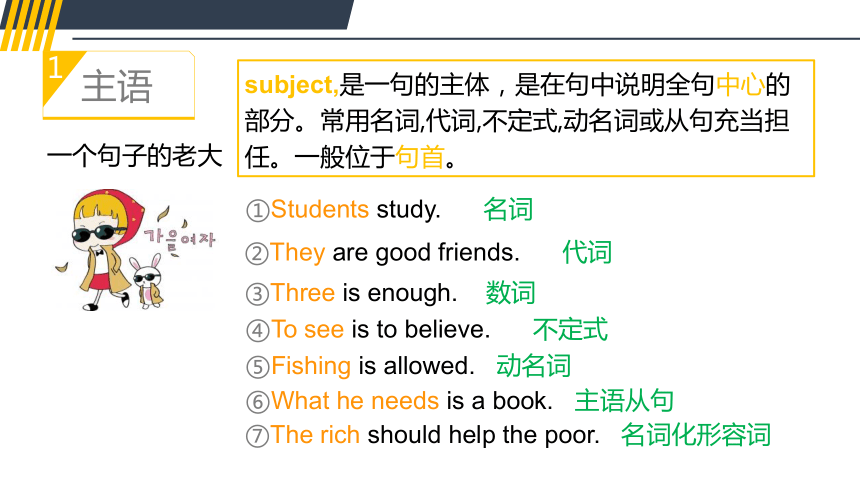
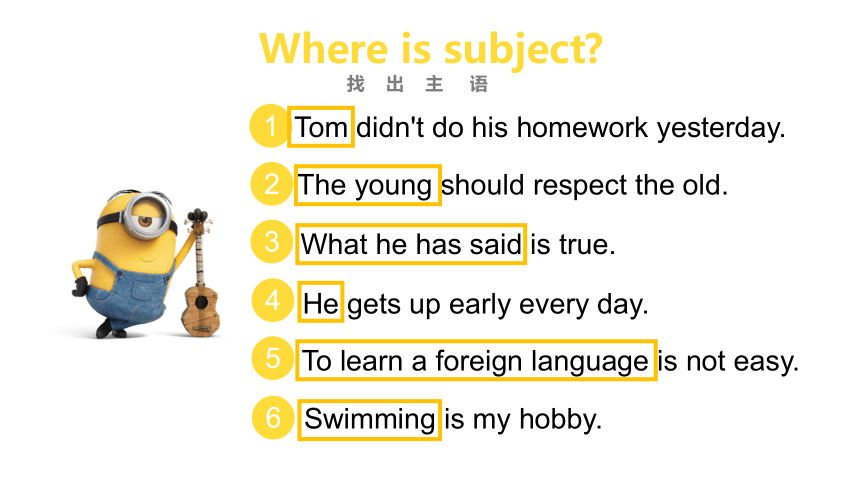
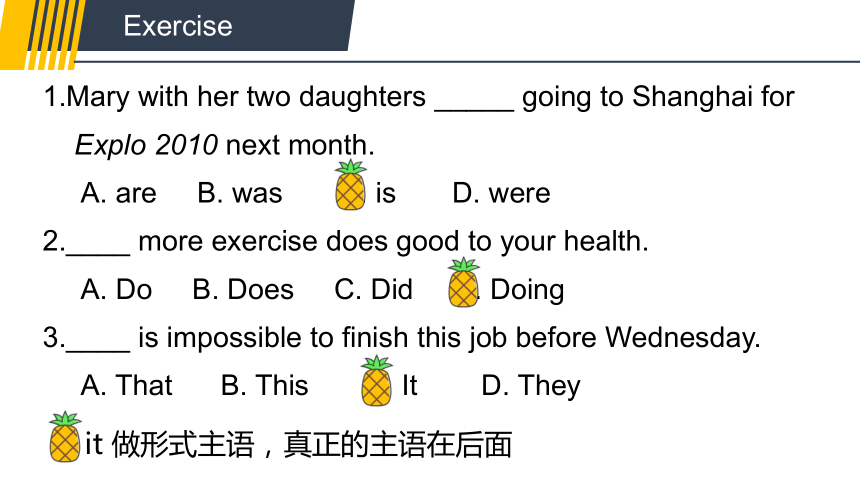

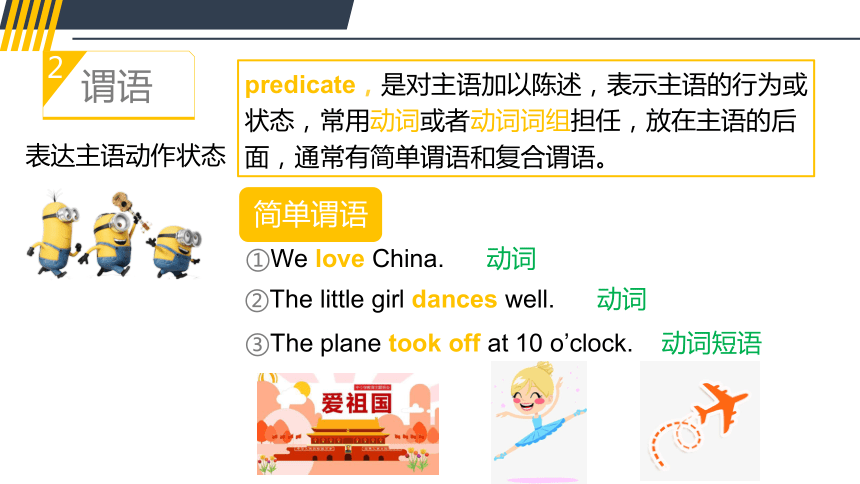

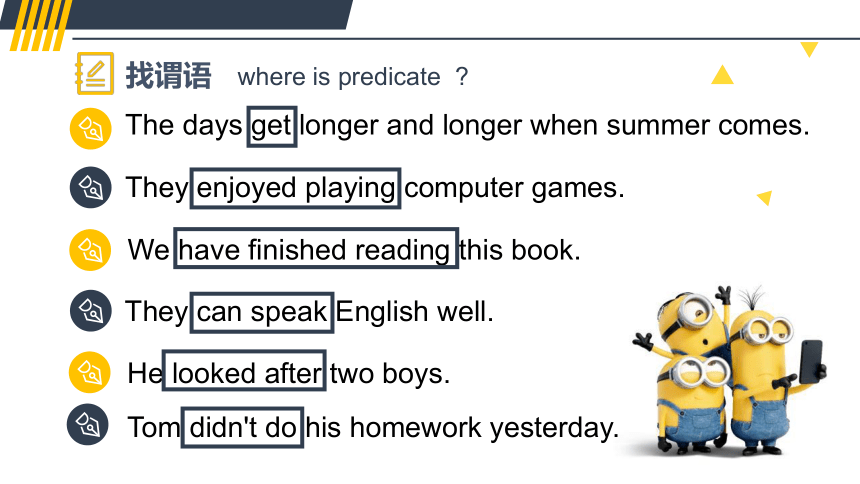
文档简介
(共90张PPT)
句子成分和句子种类
基本概念/各种分类/简单用法
Where there is a will, there is a way.
To be or not to be, this is a question.
句子成分
1
句子种类
2
CONTENTS
PART
1
句 子 成 分
member of sentence
主语
谓语
宾语
定语
状语
补语
表语
01
句子的主人
主语
02
表达主语动作状态
谓语
03
宾语
05
句子成分
04
07
06
动作行为的对象
定语
修饰名词或代词
说明动作或状态特征
状语
补语
补充说明
表语
表达主语具体情况
主语
1
subject,是一句的主体,是在句中说明全句中心的部分。常用名词,代词,不定式,动名词或从句充当担任。一般位于句首。
一个句子的老大
②They are good friends. 代词
③Three is enough. 数词
④To see is to believe. 不定式
⑤Fishing is allowed. 动名词
⑥What he needs is a book. 主语从句
①Students study. 名词
⑦The rich should help the poor. 名词化形容词
Where is subject
找 出 主 语
1
Tom didn't do his homework yesterday.
2
3
4
The young should respect the old.
What he has said is true.
He gets up early every day.
5
To learn a foreign language is not easy.
6
Swimming is my hobby.
Exercise
1.Mary with her two daughters _____ going to Shanghai for
Explo 2010 next month.
A. are B. was C. is D. were
2.____ more exercise does good to your health.
A. Do B. Does C. Did D. Doing
3.____ is impossible to finish this job before Wednesday.
A. That B. This C. It D. They
it 做形式主语,真正的主语在后面
动词不能作主语
YES OR NO
不能作主语
Do exercise is good for your health.
Eat too much meat is bad for your health.
谓语
2
predicate,是对主语加以陈述,表示主语的行为或状态,常用动词或者动词词组担任,放在主语的后面,通常有简单谓语和复合谓语。
表达主语动作状态
②The little girl dances well. 动词
③The plane took off at 10 o’clock. 动词短语
①We love China. 动词
简单谓语
谓语
2
表达主语动作状态
②You must stay at home. 情态动词+动词
④She looks beautiful. 系动词+表语
①My sister is crying over there. 系动词+表语
复合谓语
③He has caught a bad cold. 助动词+V过分
由情态动词或者其他助动词加动词构成,
或由系动词加表语构成,系动词单独不作谓语
找谓语
where is predicate
They enjoyed playing computer games.
He looked after two boys.
We have finished reading this book.
They can speak English well.
The days get longer and longer when summer comes.
Tom didn't do his homework yesterday.
祈 使 句 谓 语
SOMETHING YOU MUST NOTICE
Open the door, please!
Go and get some water for me!
Don’t laugh at others!
Don’t come back late tonight.
省略主语you&谓语动词用原形
Exercise
1.It is difficult for me ______ so much work within one night.
Can you help me
A. finish B. finishing C. to finish D. finished
2.John with two of his friends ____ to play basketball every
Sunday afternoon.
A. go B. went C. goes D.gone
3.__ up early, or you will miss the early bus.
A. Got B. Get C. Getting D.Gets
4.________ up early is good for your health.
A. Got B. Get C. Getting D.Gets
5.Wow! The cake tastes _______! Can I have one more
A. well B. deliciously C. bad D. good
宾语
3
object,表示动作的对象,是动作的承受者。宾语一般放在动词或动词短语之后。介词后也会跟宾语。
②He often helps me.
代词
③ Give me four please.
数词
①I like Music.
名词
宾语
3
④ We have finished reading this book. 动名词
⑤ He wants to dream a nice dream. 不定式
⑥ I think you are right. 从句
⑦ I am interested in music. 介词宾语
I give you
a pen
I order you to study
主
主
谓
谓
宾
宾
宾
宾补
you
a pen
双宾
两者中间无联系
宾补
两者有联系,只能是“你”学习
I made you my assistant
I keep the room warm
宾补
宾补
动作
身份
状态
宾语补足语:只补充说明宾语的动作、身份、状态。
双宾VS宾补
1
2
区别
动作
身份
状态
3
4
圈出宾语
① My brother hasn’t done his homework.
② People all over the world speak English.
③ You must pay good attention to your job.
① We should care more about our friends.
② They made him monitor of the class.
③ The old man sitting at the gate said he was ill.
A
B
C
A
A
B
C
B
C
A
D
B
C
C
D
B
A
A
B
C
D
定语
4
attribute,单词作定语时通常放在它所修饰的名词之前,短语和从句作定语时则放在它所修饰的名词之后
修饰名词或代词
①the beautiful girl
③the ugly girl
②the girl who is beautiful
④the girl who is ugly
②Tom's father didn't come back home until yesterday 名词所有格
③ Emma is a beautiful girl. 形容词
①She is a woman worker. 名词
④ I have 5 books 数词
⑤ This is her first trip to Switzerland. 形代/序数词/不定式
定语
定语
⑦I have nothing to eat. 不定式
⑥ It is a swimming pool. 动名词
⑧The girl with long hair is my sister. 介词短语
⑨He is the boy who dances best in my class. 从句
寻 找 定 语
1.The man downstairs was trying to sleep.
2.Some people forgot to sweep the floor.
D
A
B
C
D
A
B
C
3. The teaching plan for next term has been worked out.
4.He is reading an article about how to learn English.
5.The pen bought by her is made in China.
A
D
B
C
E
A
D
B
C
E
A
D
B
C
状语
5
adverbial,状语用来修饰动词,形容词或副词或全句,说明方式、因果、条件、时间、地点、让步、方向、程度、目的等。
说明动作或状态特征
②He is writing with a pen. 介词短语
③To make his dream come true, Tom becomes
very interested in business. 不定式
④He is in the room making a model plane. 分词短语
⑤Wait a minute 名词
⑥Once you begin, you must continue.从句
①Light travels most quickly. 副词及副词性词组
状语
5
说明动作或状态特征
②Mr Smith lives on the third floor.地点状语
③ I arrived late because of the traffic jam .原因状语
④He did it carefully.方式状语
⑤ We'll send a car to fetch you. 目的状语
⑥If he goes, so will I . 条件状语
①How about meeting again at six. 时间状语
⑦Though he is a child, he knows a lot.让步状语
⑧She came in with a dictionary in her hand. 伴随状语
⑨He was so tired that he fell asleep. 结果状语
⑩I am taller than he is. 比较状语
找出状语
JUST HAVE A TRY
There was a big smile on her face.
He began writing when he was eleven.
Unfortunately, he lost all of his money.
D
A
C
B
D
A
C
B
D
A
C
B
补语
6
complement,英语有些及物动词,除了要有宾语之外,还要加上宾语补足语,才能使句子的意义完整。它起补充说明宾语干什么,怎么样的作用.
补充说明宾语情况
②The result made me angry. 形容词
③Let the fresh air in. 副词
①If you let me go, I’ll make you king.名词
补语
6
补充说明宾语情况
④You mustn’t force him to lend his money to you.
动词不定式
⑤We saw her entering the room. 现在分词
⑥We found everything in good order there. 介词短语
⑦I saw him going upstairs. 现在分词
⑧They found the house broken in. 过去分词
找出宾补
1.They call me Lily sometimes.
A
C
B
D
2.I saw Mr. Wang get on the bus.
3.She found it difficult to do the work.
4.He asked her to take the boy out of school.
E
A
C
B
D
A
C
B
D
E
A
C
B
D
E
表语
7
predicative,系动词之后。是用来说明主语的性质、特征、状态与身份。
表达主语具体情况
②Is it yours 代词
③The weather has turned cold. 形容词
①My father is a professor. 名词
④Time is up. The class is over. 副词
⑤Three times seven is twenty one.数词
⑥The meeting is of great importance.介词短语
表语
7
系动词之后。是用来说明主语的性质、特征、状态与身份。
表达主语具体情况
⑧His hobby is playing football. 动名词
⑨The speech is exciting. 分词
⑦His job is to teach English.不定式
⑩The truth is that he has never been abroad.从句
系动词
感官:smell, feel, taste,
sound, look ---
渐变:become, get, turn,
go, come, grow ---
持续:remain, stay, keep,
continue ---
表象:seem, appear,
look ---
终止:prove, turn out---
He is a teacher.
This kind of cloth feels very soft.
She grew rich within a short time.
He always kept silent at meeting.
He seems (to be) very sad.
His plan turned out a success.
找出表语
1.Everything looks nice.
A
C
B
2.His face turned red.
3.They are at home now.
4.Seeing is believing.
A
C
B
D
A
C
B
D
A
C
B
句子成分 意义 充当词类 例句
主语 表示句子说的是什么人或 什么事 名,代,数,不定式, 动名词,短语或句子 We study in HuangQiao
Middle School.
谓语 说明主语做什么,是什么 或怎么样 动词或动词词组 She is dancing under the
tree.
宾语 表示动作行为的对象 同主语 Both of us like English.
表语 与联系动词连用,一起构成谓 语,说明主语的性质或特征 同主语 Her father is a chemist.
His words sound reasonable.
定语 用来修饰名词或代词 形,代,数,名, 副,介词短语或句子 We have eight lessons every day.
状语 修饰动词,形容词,副词,表 示动作发生的时间,地点,原 因,目的,方式,结果等 副词,介词短语或句 子 He works very hard.
They held a party in Hollywood.
宾语 补足语 逻辑上与宾语是主谓关系 形容词,名词,介词 短语等 She always keeps the house
clean.
主语谓语是基础,宾表定状补辅助。宾主来自名代数,动词作谓不可无!
Five Sentence Structures
34
系动词
Linking word
不及物动词 Vi.
及物动词 Vt.
主+系+表
主+谓+间宾+直宾
I am a teacher.
Every second matters.
You have many new books
He gives me some money.
They painted the wall white.
动词 v.
及物动词 Vt.
主+谓
主+谓+宾+宾补
主+谓+宾
Exercise
1. ____ will leave for Beijing.
A. Now there the man B. The man here now
C. The man who is here now D. The man is here now
2. The weather ____.
A. wet and cold B. is wet and cold
C. not wet and cold D. were wet and cold
3. The apple tasted ____.
A. sweets B. sweetly C. nicely D. sweet
4. He got up ____ yesterday morning.
A. lately B. late C. latest D. latter
5. The actor ______at the age of 70.
A. dead B. died C. dyed D. dying
Exercise
6. ___were all very tired, but none of ____ would stop to take a rest.
A. We, us B. Us, we C. We, our D. We, we
7. He found the street much ______.
A. crowd B. crowding C. crowded D. crowdedly
8.I think _____necessary to learn English well.
A. its B. it C. that D. that is
9. The dog ____ mad.
A. looks B. is looked C. is being looked
10.I will never forget the day ______ I joined the army.
A. that B. when C. in which D. where
PART
2
句 子 种 类
type of sentence
1
一、按句子的语气分类
肯定句
否定句
2
疑问句
一般疑问句
特殊疑问句
选择疑问句
反意疑问句
3
祈使句
肯定祈使句
否定祈使句
4
感叹句
what引导
how引导
陈述句
01
陈述句
What's the declarative sentence
陈述句是用来说明一个事实和表达说话人的看法或观点的句子,读时用降调
eg.She is a good student.
We are going to do our homework.
陈述句的肯定形式
1.主语+系动词+表语 The flower is beautiful.
2.主语+谓语动词 The teacher smiled.
3.主语+谓语动词+宾语 I like singing a song.
4.主语+谓语动词+宾语+宾语补足语 I love you my dear Mum.
陈述句的否定形式
1.主语+be动词+not+其他
You aren't a good student.
2.主语+助动词(do)+not+实意动词+其他
She doesn't like fruit.
3.主语+情态动词+not+实意动词+其他
You shouldn't stay up so late.
4.否定的缩写形式
is not =isn't are not =aren't
was not=wasn't were not=weren't
do not=don't does not=doesn't
did not=didn't will not=won't
Exercise
1.She does her homework erery evening.(改为否定句)
2.We don't have any lessons on Sunday.(改为肯定句)
3.You are at home now.(改为否定句)
4.He is going to visit the farm next Friday.(改为否定句)
5.You won't get fatter.(改为肯定句)
6.He didn't come home on time.(改为肯定句)
She doesn't her homework erery evening.
We have any lessons on Sunday
You are not at home now
He isn't going to visit the farm next Friday.
You will get fatter.
He came home on time
02
疑问句
一般疑问句
Is ………………
Are ………………
Was ………………
Were ……………
Do …………
Did …………
Does …………
Can …………
一般疑问句的回答只能用Yes或No.
be动词
情态动词
助动词
1.This is Amy's bike.(一般疑问句)
Is this Amy's bike
2.Did you go to Beijing last weekend
Yes, I did. (肯定回答)
No, I didn't. (否定回答)
Yes, this is. (肯定回答)
No, this isn't. (否定回答)
3.I have some books. (一般疑问句)
Do you have any books
特殊疑问句
表示疑问,有疑问词(在开头),回答有很多种可能。
常用疑问词:
When 什么时间 (问时间)
Who 谁 ( 问人)
Where 在哪里 (问地点)
Which 哪一个 (问选择)
Why 为什么 (问原因)
What 什么 ( 问东西、事物)
How 怎样 (问方式、手段,程度、情况等)
Mike: _______are we going to stay in Harbin
Mum: In Grandma’s big house.
Mike: _______does Grandma like eating
Mum: She likes eggs very much.
Mike: _______season is the best time to Harbin
Mum: Winter.
Mike: _______
Mum: Because we can make a snowman there.
Mike: ________are we going to this year
Mum: we will go to Harbin.
Mike: ________are we going to Harbin
Mum: On 10th Octomber.
Mike: ________do you go to there
Mum: By plane.
Where
Why
What
Where
When
Which
How
Exercise
1. S: _______ did you go last Sunday
T: I went to the library.
A When B Where C What D Who
2.Amy: _______ bought the new bike for you
Mike: My father.
A How B Where C What D Who
3.S: Was this book in the desk
T: _______
A Yes,it is. B No,it was C Yes,it wasn’t D No,it wasn’t
4.S: _______ heavy is John
T: He is 42kg.
A How B What C Who D Where
选择疑问句
选择疑问句表示提供两种或者两种以上的情况,要求对方在所提供的范围和对象内
选择。备选对象用or 连接,or 后面用降调,句末用问号。
结构
A.一般疑问句+or+另外的备选对象。
e.g: Would you like some coffee or tea
B.特殊疑问句+or+另外的备选对象。
e.g: When will you go to Canada, Sunday or Monday
选择疑问句的回答
1.从备选答案中选择某一项回答。
-Are you going to borrow a dictionary or a magazine -_____.
A. Yes, a dictionaryB. No , a magazineC. A magazine D. Yes , both.
2.选择对象是二者,可二选一就用肯定的either;两个都可以选表示肯定的both;两个对象都不选就用表示否定的neither。
-Would you like chicken noodles or beef noodles -_____.I like tomato noodles.
A. Either B. Neither C. Both D. None
3.备选对象是三者,可任选其一时,就用one of them;三个对象都选就用all;三个对象都不选就用none.
-Which do you like best, coffee, water or juice
-______. I only like tea.
A. Both B. Either C. Neither D.None
It’s cold ,___________
isn’t it
Yes,it is.
They are playing football,_________
aren’t they
Yes, they are.
They weren’t in the zoo last Sunday, _________
No, they weren’t. They went to the mountains.
were they
It rained heavily yesterday, _______
didn’t it
Yes, it did.
1. She is a student, isn’t she
2. We speak Chinese, don’t we
当我们陈述了一个事实,而又不是很有把握,就可以在陈述句后加一个简短问句,称为反意疑问句。
反意疑问句
结构一: 前肯,+ 后否
eg. She is a student, isn’t she
结构二: 前否,+ 后肯
eg. She isn’t a student, is she
反意疑问句的解答步骤
1. 判定(判断该用肯定还是否定);
She is a girl,
1.判定:前句为肯定,后句为否定
2.找be动词,是is,则后半句用isn’t
3.换代,主语是she,则不变
isn’t she
2. 找动(找句子的助动词:be用be,动词原形do,三单does,过
去did,完成have);
3. 换代(将主语换为代词主格形式);
2. 找动(找句子的助动词)
be动词
情态动词
助动词
have
①
②
③
④
1.She will leave ,
won’t she
2.I was ill ,
wasn't I
3.He has bought a car,
hasn’t he
4.She likes red ,
doesn’t she
5.I am Chinese,
aren’t I
小尾巴结构
动(n't)+主
必缩写
人称主格
does
1.Lily can play football ,
2.Tom will visit China next month ,
3.You ‘d better lie down and have a rest ,
4.You can’t go out ,
①情态动词
当have 在完成时中或“You had better”中时,
也当情态动词变。
can’t she
Won’t he
Hadn’t you
Can you
②be动词
1.It’s a nice day ,
2.The Greens were at home last night ,
3.Ben isn’t a bed boy ,
4.Tom is skating ,
Isn’t it
Weren’t they
Is he
Isn’t he
前肯后否
前否后肯
There is/are/will be…, isn’t/aren’t/won’t there?
1.There is a pen on the chair,
2.There are 60 students in our class,
3. There will be a birthday party tomorrow,
isn’t there
aren’t there
won’t there
④There be
③have完成时
Have/haven’t,has/hasn't ,had/hadn’t
1.You have been to Beijing ,
haven’t you
2.He has finished his homework ,
hasn’t he
要变反义疑问句,谨记动词加主语;
前后肯否不统一,人代主格there be
Exercise
1.There is little milk in the glass, _______
A. isn’t it B. isn’t there C. is there D. is it
2.There are a few people in the room, ____
A. are there B. aren’t there C. are they D. aren’t they
3.She’s already back., _______
A doesn’t she B isn’t she C hasn’t she D has she
4.The tall man over there isn't our new English teacher, _______
A. is he B. is there C. isn’t he D. isn’t there
1.找到动词
2.判断肯否、时态及助动词
3.主语照抄(若是名词 便改为代词主格形式)
Tina speaks English well ,
Doesn’t she
1.找到动词是
speaks
2.判断:
肯定、一般现在时 助动词用does
3.主语:
(tina是名词 女名 则改为she)
⑤助动词
Exercise
1.My mother has to stay at home to look after my grandma,
_______
A. hasn’t she B. hasn’t my mother
C. doesn’t she D.doesn’t my mother
2.It rained hard last night,______
A. does it B. did it C. doesn’ t it D. didn’ t it
3.Lucy didn’t come to school yesterday, ____
A. did she B. didn’t she C. dos she D. doesn’t she
4.You have to keep quiet while watching the film, _______ you
A. haven’t B. don’t C. didn’t D. will
其他(1)
当陈述部分有never,seldom(很少), hardly(几乎不),few,little,nothing(没有) 等否定意义的词时,后面的反意疑问句则为肯定形式
1.They have never visited his home,
2.There are few apples in the basket
3.He can hardly swim
4.It has no legs
5.There is little water in the glass
6.They seldom come late
have they
,are there
,can he
,does it
,is there
,do they
7.He is too young to join the army,
is he?
Exercise
1.They have never been to America, _______
A. have they B. haven’t they C. don’t they D. do they
2.There is little milk in the glass, _______
A. isn’t it B. isn’t there C. is there D. is it
3.There are a few people in the room, ____
A. are there B. aren’t there C. are they D. aren’t they
4.They seldom think about the people, __________
A. do they B. don’t they C. are they D. aren’t they
5.―He hardly has any friends to play with , _____ he
―_______! That’s why he feels lonely from time to time.
A. hasn’t, No B. doesn’t, Yes C. does, Yes D. does, No
其他(2)祈使句
在祈使句后面附加问句,以加强语气或使祈使句听起来较委婉、客气
1. Sit down please, _______________
2. Please call me, _________________
3. Let’s go home, ________________
4. Let us go home, ________________
5. Don’t leave now, ________________
will / won’t you
shall we
will you
will you
will / won’t you
其他(3)let
当为”let us(你让我们)”时 疑问句为“will you” 前五后四
当为”let’s(让我们)”时 疑问句为“shall we” 前四后五
1.Let’s go to park,
2.Let us do homework.
Shall we
Will you
其他(4)回答
不管肯定否定,只抓信息点,是否吻合。
1.Tom 18 岁
Yes, he is
Tom isn't 18 years old,is he
2.Tom 不是中国人
No, he isn't.
Tom is Chinese,isn' he
去掉动词,如实回答
其他(5)
主语是everyone, someone, anyone, no one, nobody等不定代词时,反意疑问句的主语一般用they或he指代
1.Everyone in your family is fond of swimming, aren’t they
你们全家都喜欢游泳,是吗?
2.Anyone can do that, ___________
3.Someone is knocking at the door, __________
4.No one knows about it, __________
can’t they
aren’t they
do they
其他(6)
主语是everything, something, anything, nothing等不定代词时,反意疑问句的主语一般用it指代。
1.Nothing is important for him, is it
2.Something is wrong with your computer, _________
3.Everything is ready for the test, __________
isn’t it
isn’t it
其他(7)
陈述部分是感叹句
1.What a clever boy, ______________
2.How rude the boy is, __________
isn’t he
isn’t he
其他(8)
如果陈述部分的主语是this/that 或these/those,反义疑问句的主语就用it或they.
1.This is very easy, ______________
2.These are your friends Tom and Tim _________
isn’t it
aren’t they
其他(9)
如果陈述部分是一个主从复合句,反义疑问句部分就看主句部分,但如果陈述部分的主语是I,谓语动词是think/suppose/believe/expect,反义疑问句部分就要看从句部分了。
1.She says that I did it, ____________
2. I don’t think she cares, __________
doesn’t she
does she
主肯后否,
主否后肯,
从句选词
Exercise
1.--Let’s go shopping, _____
--Ok, let’s go.
A. do you B. don’t you C. will you D. shall we
2.Rose, we will start at six tomorrow morning. Don't be late,______
—_______,I'll be there on time
A.won't you;Yes,I will B.will you;Yes,I will
C.will you;No,I won't D.won't you,No,I won't
3.I don’t think dropping litter is allowed in Yellow River Park, _____
A. do I B. is it C. isn’t it D. don’t I
4.—He’s never told lies,_____ he —_____,he’s an honest boy.
A. is , No B. isn’t , Yes C. has , No D. hasn’t , Yes
03
祈使句
Turn left!
Turn right!
Don’t smoke!
No smoking!
Don’t park
your car!
Don’t play
football!
Don’t eat!
定义:用于表达命令、请求、劝告、警告、禁止等的句子叫作祈使句。
祈使句因对象(即主语)是第二人称,所以通常都省略。祈使句的
动词都为一般现在时,句末一般使用句号或感叹号来表示结束。
1.Go and wash your hands.去洗你的手。
2.Buy me a toy,please./Please buy me a toy.请给我买个玩具。
3.Be kind to our sister.对我们的妹妹要和善。
4.Watch your steps. 走路小心。
5.Keep off the grass.勿踏草坪。
命令
请求
劝告
警告
禁止
祈使句
是个句子
祈使句无主语,动原开头要牢记,表示命令或建议;
否定祈使句,Don't 开头就可以
Be a good boy!
Buy me a toy car!
肯定形式
否定形式
1.Be 型:系动词原形be+表语+其他
3.Let型:Let+宾语+动词原形+其他
2.Do型:行为动词的原形+宾语+其他
1.Be 型:Don't +be+表语+其他
2.Do型:Don't+行为动词+宾语+其他
3.Let型:1)Don't +let+宾语(第三人称)+动词原形+其他
2)Let+宾语(第一、三人称)+not+动词原形+其他
Let him go!
Don't be late for school!
Don't buy me a toy car!
Don't let him go!
Let him not go!
Let 's not go!
4.有些可用no开头,用来表示禁止性的祈使句。
No smoking!
No fishing!
祈使句
表现形式
考点①
所有的祈使句的反义疑问句都是will you,只有let‘s go这种类型的是shall we?
注意
考点②
考点③
句子转化
What can make you happy
_____, and you will be happy.
A.Smiles B. Smile C. Smiling D.To smile
连词
+句子
句子+
_____can make you happy.
C
1)If you study hard,you will get a high mark.
__________,_____you will get a high mark.
2)If you don't study hard,you will fail the exam.
______you study hard,you will fail the exam.
Study hard,_____you will fail the exam.
Study hard
and
Unless
or
Exercise
1. Jim, _____ me a hand.
A. gives B. is giving C. will give D. give
2. ____ careful, Jenny! There is a tree in front of you.
A. Am B. / C. Be D. Was
3. Let's ____ our time.
A. not waste B. no wasting C. not to waste D. no waste
4. —____ higher, and you will see the house.—OK.
A. If you stand B. To stand
C. When you stand D. Stand
5. Please ___ do it.
A. he B. let him C. let he D. him
6. _____ let anyone open the door.
A. Don't B. Will C. Not D. No
04
感叹句
(the queen of hearts红心皇后)
A strange woman
She is a strange woman.
What a strange woman she is !
她是一个多么奇怪的人啊
A tall girl
Alice is a very tall girl.
What a tall girl Alice is!
What a tall girl Alice is!
What a strange woman she is !
What fat boys they are!
What +(a/an) + adj.(形容词) +n.(名)+主+谓!
Find out the rule!
用户可以在投影仪或者计算机上可以将演示文稿打印出来制作成胶片
What a beautiful flower __ __ !
What cold weather __ __ !
What an exciting film __ __ !
What lovely birds ____ ___ !
it is
it is
it is
they are
主语+谓语
noun phrase
名词短语
What+____________+主语+谓语!
单数
可数名词
复数
可数名词
不可数名词
Alice runs fast.
How fast Alice runs!
The queen’s hair is very white.
How white the queen’s hair is!
How fast Alice runs!
How white the queen’s hair is!
How crazy the rabbit is!
How +adj./adv.(形容词/副词)+主语+谓语!
Find out the rule!
用What\how填空
1._____ fast!
2._____ a fast car!
3._____ fast cars!
4._____ cold water!
5._____ much water!
6._____ little water!
What
How
What
How
What
How
7._____ fast a car!
8._____ a good book!
9._____ good books!
10._____many books !
11._____ few books!
12._____ little boys!
How
What
What
How
How
What
名前what
形副how
多多少少都用how
多多少少是什么
many、much、
little、few
①________important news she told us
the class meeting held yesterday.
②________fun we had last night!
What
What
感叹句先断句,主语以后都省去
引导词:
What\how
区 别:
去掉主谓部分,
中心语是形容词或副词的用how;
中心语是名词的用what.
用What\how填空
_____ a bright boy he is!
_____ bright the boy is!
_____ good apples they are!
_____ good the apples are!
_____ cold weather it is!
_____ cold the weather is!
What
How
What
How
What
How
Exercise
1. _____bad weather it is!
A.How B.How a C. What D.What a
2._____interesting it is to go sailing in Qingdao in summer!
A.What B.What an C.How D.How an
3. ______ food you are cooked!
A.How a nice B.What a nice
C.How nice D.How a
4.________beautiful day it is! Let's go and have a picnic in the park. --Good idea!
A. How B. How a C. What D. What a
Exercise
5.Kate has won the first prize in the singing competition.
--______pleasant surprise this gave her classmates!
A. What B. How C. What a D. How a
6._______ great man Huang Furong is! He lost his life while saving
the students in the Yushu earthquake.
A. How B. How a C. What D. What a
7. _______exciting sport it is to climb the mountains!
A. How B. What C. What a D. What an
8.__wide the streets are!
A. What B. How C. What a
Exercise
9._________happily the children are flying kites!
A.What B.What a C.How D.How a
10.______ hard work you have done!
-It's very kind of you to say so.
A.What B. How C. What a D. How a
11. -Have you seen the film Alice in Wonderful
Yes. ____________ wonderful film it is!
A.What B. What a C. How D. How a
12._____ meeting it is!
A.What a important B. What important
C. How an important D. What an important
二、按句子结构分类:
The simple sentences(简单句)
The compound sentences(并列句)
The complex sentences(复合句)
1.简单句:
由一个主语和一个谓语构成的句子(含并列主语和并列谓语情况)
主语+谓语
主语+系+表
主语+谓语+宾语
主语+谓语+间接宾语(对象/人)+直接宾语(内容/物)
主语+谓语+宾语+宾补
2.并列句:由并列连词等将两个或两个以上的简单句连在一起而构成的句子。
并列连词有: and ,so , but, or, then, however, still ,for等等。
but/yet 表转折
While 表对比
for, so 表因果
and 表顺延
3.复合句:指的是含有两个或更多的主谓结构的句子,其中有一个主谓结构充当句子的某一成分(即是从句)。如主语、宾语、表语、定语、状语等。
根据从句在复合句中所充当的成分,从句可划分为两类:
1.名词性从句(宾语从句、表语从句、主语从句等)
2.修饰性从句 ①副词性从句 (状语从句)
②形容词性从句 (定语从句)
THANK YOU
句子成分和句子种类
基本概念/各种分类/简单用法
Where there is a will, there is a way.
To be or not to be, this is a question.
句子成分
1
句子种类
2
CONTENTS
PART
1
句 子 成 分
member of sentence
主语
谓语
宾语
定语
状语
补语
表语
01
句子的主人
主语
02
表达主语动作状态
谓语
03
宾语
05
句子成分
04
07
06
动作行为的对象
定语
修饰名词或代词
说明动作或状态特征
状语
补语
补充说明
表语
表达主语具体情况
主语
1
subject,是一句的主体,是在句中说明全句中心的部分。常用名词,代词,不定式,动名词或从句充当担任。一般位于句首。
一个句子的老大
②They are good friends. 代词
③Three is enough. 数词
④To see is to believe. 不定式
⑤Fishing is allowed. 动名词
⑥What he needs is a book. 主语从句
①Students study. 名词
⑦The rich should help the poor. 名词化形容词
Where is subject
找 出 主 语
1
Tom didn't do his homework yesterday.
2
3
4
The young should respect the old.
What he has said is true.
He gets up early every day.
5
To learn a foreign language is not easy.
6
Swimming is my hobby.
Exercise
1.Mary with her two daughters _____ going to Shanghai for
Explo 2010 next month.
A. are B. was C. is D. were
2.____ more exercise does good to your health.
A. Do B. Does C. Did D. Doing
3.____ is impossible to finish this job before Wednesday.
A. That B. This C. It D. They
it 做形式主语,真正的主语在后面
动词不能作主语
YES OR NO
不能作主语
Do exercise is good for your health.
Eat too much meat is bad for your health.
谓语
2
predicate,是对主语加以陈述,表示主语的行为或状态,常用动词或者动词词组担任,放在主语的后面,通常有简单谓语和复合谓语。
表达主语动作状态
②The little girl dances well. 动词
③The plane took off at 10 o’clock. 动词短语
①We love China. 动词
简单谓语
谓语
2
表达主语动作状态
②You must stay at home. 情态动词+动词
④She looks beautiful. 系动词+表语
①My sister is crying over there. 系动词+表语
复合谓语
③He has caught a bad cold. 助动词+V过分
由情态动词或者其他助动词加动词构成,
或由系动词加表语构成,系动词单独不作谓语
找谓语
where is predicate
They enjoyed playing computer games.
He looked after two boys.
We have finished reading this book.
They can speak English well.
The days get longer and longer when summer comes.
Tom didn't do his homework yesterday.
祈 使 句 谓 语
SOMETHING YOU MUST NOTICE
Open the door, please!
Go and get some water for me!
Don’t laugh at others!
Don’t come back late tonight.
省略主语you&谓语动词用原形
Exercise
1.It is difficult for me ______ so much work within one night.
Can you help me
A. finish B. finishing C. to finish D. finished
2.John with two of his friends ____ to play basketball every
Sunday afternoon.
A. go B. went C. goes D.gone
3.__ up early, or you will miss the early bus.
A. Got B. Get C. Getting D.Gets
4.________ up early is good for your health.
A. Got B. Get C. Getting D.Gets
5.Wow! The cake tastes _______! Can I have one more
A. well B. deliciously C. bad D. good
宾语
3
object,表示动作的对象,是动作的承受者。宾语一般放在动词或动词短语之后。介词后也会跟宾语。
②He often helps me.
代词
③ Give me four please.
数词
①I like Music.
名词
宾语
3
④ We have finished reading this book. 动名词
⑤ He wants to dream a nice dream. 不定式
⑥ I think you are right. 从句
⑦ I am interested in music. 介词宾语
I give you
a pen
I order you to study
主
主
谓
谓
宾
宾
宾
宾补
you
a pen
双宾
两者中间无联系
宾补
两者有联系,只能是“你”学习
I made you my assistant
I keep the room warm
宾补
宾补
动作
身份
状态
宾语补足语:只补充说明宾语的动作、身份、状态。
双宾VS宾补
1
2
区别
动作
身份
状态
3
4
圈出宾语
① My brother hasn’t done his homework.
② People all over the world speak English.
③ You must pay good attention to your job.
① We should care more about our friends.
② They made him monitor of the class.
③ The old man sitting at the gate said he was ill.
A
B
C
A
A
B
C
B
C
A
D
B
C
C
D
B
A
A
B
C
D
定语
4
attribute,单词作定语时通常放在它所修饰的名词之前,短语和从句作定语时则放在它所修饰的名词之后
修饰名词或代词
①the beautiful girl
③the ugly girl
②the girl who is beautiful
④the girl who is ugly
②Tom's father didn't come back home until yesterday 名词所有格
③ Emma is a beautiful girl. 形容词
①She is a woman worker. 名词
④ I have 5 books 数词
⑤ This is her first trip to Switzerland. 形代/序数词/不定式
定语
定语
⑦I have nothing to eat. 不定式
⑥ It is a swimming pool. 动名词
⑧The girl with long hair is my sister. 介词短语
⑨He is the boy who dances best in my class. 从句
寻 找 定 语
1.The man downstairs was trying to sleep.
2.Some people forgot to sweep the floor.
D
A
B
C
D
A
B
C
3. The teaching plan for next term has been worked out.
4.He is reading an article about how to learn English.
5.The pen bought by her is made in China.
A
D
B
C
E
A
D
B
C
E
A
D
B
C
状语
5
adverbial,状语用来修饰动词,形容词或副词或全句,说明方式、因果、条件、时间、地点、让步、方向、程度、目的等。
说明动作或状态特征
②He is writing with a pen. 介词短语
③To make his dream come true, Tom becomes
very interested in business. 不定式
④He is in the room making a model plane. 分词短语
⑤Wait a minute 名词
⑥Once you begin, you must continue.从句
①Light travels most quickly. 副词及副词性词组
状语
5
说明动作或状态特征
②Mr Smith lives on the third floor.地点状语
③ I arrived late because of the traffic jam .原因状语
④He did it carefully.方式状语
⑤ We'll send a car to fetch you. 目的状语
⑥If he goes, so will I . 条件状语
①How about meeting again at six. 时间状语
⑦Though he is a child, he knows a lot.让步状语
⑧She came in with a dictionary in her hand. 伴随状语
⑨He was so tired that he fell asleep. 结果状语
⑩I am taller than he is. 比较状语
找出状语
JUST HAVE A TRY
There was a big smile on her face.
He began writing when he was eleven.
Unfortunately, he lost all of his money.
D
A
C
B
D
A
C
B
D
A
C
B
补语
6
complement,英语有些及物动词,除了要有宾语之外,还要加上宾语补足语,才能使句子的意义完整。它起补充说明宾语干什么,怎么样的作用.
补充说明宾语情况
②The result made me angry. 形容词
③Let the fresh air in. 副词
①If you let me go, I’ll make you king.名词
补语
6
补充说明宾语情况
④You mustn’t force him to lend his money to you.
动词不定式
⑤We saw her entering the room. 现在分词
⑥We found everything in good order there. 介词短语
⑦I saw him going upstairs. 现在分词
⑧They found the house broken in. 过去分词
找出宾补
1.They call me Lily sometimes.
A
C
B
D
2.I saw Mr. Wang get on the bus.
3.She found it difficult to do the work.
4.He asked her to take the boy out of school.
E
A
C
B
D
A
C
B
D
E
A
C
B
D
E
表语
7
predicative,系动词之后。是用来说明主语的性质、特征、状态与身份。
表达主语具体情况
②Is it yours 代词
③The weather has turned cold. 形容词
①My father is a professor. 名词
④Time is up. The class is over. 副词
⑤Three times seven is twenty one.数词
⑥The meeting is of great importance.介词短语
表语
7
系动词之后。是用来说明主语的性质、特征、状态与身份。
表达主语具体情况
⑧His hobby is playing football. 动名词
⑨The speech is exciting. 分词
⑦His job is to teach English.不定式
⑩The truth is that he has never been abroad.从句
系动词
感官:smell, feel, taste,
sound, look ---
渐变:become, get, turn,
go, come, grow ---
持续:remain, stay, keep,
continue ---
表象:seem, appear,
look ---
终止:prove, turn out---
He is a teacher.
This kind of cloth feels very soft.
She grew rich within a short time.
He always kept silent at meeting.
He seems (to be) very sad.
His plan turned out a success.
找出表语
1.Everything looks nice.
A
C
B
2.His face turned red.
3.They are at home now.
4.Seeing is believing.
A
C
B
D
A
C
B
D
A
C
B
句子成分 意义 充当词类 例句
主语 表示句子说的是什么人或 什么事 名,代,数,不定式, 动名词,短语或句子 We study in HuangQiao
Middle School.
谓语 说明主语做什么,是什么 或怎么样 动词或动词词组 She is dancing under the
tree.
宾语 表示动作行为的对象 同主语 Both of us like English.
表语 与联系动词连用,一起构成谓 语,说明主语的性质或特征 同主语 Her father is a chemist.
His words sound reasonable.
定语 用来修饰名词或代词 形,代,数,名, 副,介词短语或句子 We have eight lessons every day.
状语 修饰动词,形容词,副词,表 示动作发生的时间,地点,原 因,目的,方式,结果等 副词,介词短语或句 子 He works very hard.
They held a party in Hollywood.
宾语 补足语 逻辑上与宾语是主谓关系 形容词,名词,介词 短语等 She always keeps the house
clean.
主语谓语是基础,宾表定状补辅助。宾主来自名代数,动词作谓不可无!
Five Sentence Structures
34
系动词
Linking word
不及物动词 Vi.
及物动词 Vt.
主+系+表
主+谓+间宾+直宾
I am a teacher.
Every second matters.
You have many new books
He gives me some money.
They painted the wall white.
动词 v.
及物动词 Vt.
主+谓
主+谓+宾+宾补
主+谓+宾
Exercise
1. ____ will leave for Beijing.
A. Now there the man B. The man here now
C. The man who is here now D. The man is here now
2. The weather ____.
A. wet and cold B. is wet and cold
C. not wet and cold D. were wet and cold
3. The apple tasted ____.
A. sweets B. sweetly C. nicely D. sweet
4. He got up ____ yesterday morning.
A. lately B. late C. latest D. latter
5. The actor ______at the age of 70.
A. dead B. died C. dyed D. dying
Exercise
6. ___were all very tired, but none of ____ would stop to take a rest.
A. We, us B. Us, we C. We, our D. We, we
7. He found the street much ______.
A. crowd B. crowding C. crowded D. crowdedly
8.I think _____necessary to learn English well.
A. its B. it C. that D. that is
9. The dog ____ mad.
A. looks B. is looked C. is being looked
10.I will never forget the day ______ I joined the army.
A. that B. when C. in which D. where
PART
2
句 子 种 类
type of sentence
1
一、按句子的语气分类
肯定句
否定句
2
疑问句
一般疑问句
特殊疑问句
选择疑问句
反意疑问句
3
祈使句
肯定祈使句
否定祈使句
4
感叹句
what引导
how引导
陈述句
01
陈述句
What's the declarative sentence
陈述句是用来说明一个事实和表达说话人的看法或观点的句子,读时用降调
eg.She is a good student.
We are going to do our homework.
陈述句的肯定形式
1.主语+系动词+表语 The flower is beautiful.
2.主语+谓语动词 The teacher smiled.
3.主语+谓语动词+宾语 I like singing a song.
4.主语+谓语动词+宾语+宾语补足语 I love you my dear Mum.
陈述句的否定形式
1.主语+be动词+not+其他
You aren't a good student.
2.主语+助动词(do)+not+实意动词+其他
She doesn't like fruit.
3.主语+情态动词+not+实意动词+其他
You shouldn't stay up so late.
4.否定的缩写形式
is not =isn't are not =aren't
was not=wasn't were not=weren't
do not=don't does not=doesn't
did not=didn't will not=won't
Exercise
1.She does her homework erery evening.(改为否定句)
2.We don't have any lessons on Sunday.(改为肯定句)
3.You are at home now.(改为否定句)
4.He is going to visit the farm next Friday.(改为否定句)
5.You won't get fatter.(改为肯定句)
6.He didn't come home on time.(改为肯定句)
She doesn't her homework erery evening.
We have any lessons on Sunday
You are not at home now
He isn't going to visit the farm next Friday.
You will get fatter.
He came home on time
02
疑问句
一般疑问句
Is ………………
Are ………………
Was ………………
Were ……………
Do …………
Did …………
Does …………
Can …………
一般疑问句的回答只能用Yes或No.
be动词
情态动词
助动词
1.This is Amy's bike.(一般疑问句)
Is this Amy's bike
2.Did you go to Beijing last weekend
Yes, I did. (肯定回答)
No, I didn't. (否定回答)
Yes, this is. (肯定回答)
No, this isn't. (否定回答)
3.I have some books. (一般疑问句)
Do you have any books
特殊疑问句
表示疑问,有疑问词(在开头),回答有很多种可能。
常用疑问词:
When 什么时间 (问时间)
Who 谁 ( 问人)
Where 在哪里 (问地点)
Which 哪一个 (问选择)
Why 为什么 (问原因)
What 什么 ( 问东西、事物)
How 怎样 (问方式、手段,程度、情况等)
Mike: _______are we going to stay in Harbin
Mum: In Grandma’s big house.
Mike: _______does Grandma like eating
Mum: She likes eggs very much.
Mike: _______season is the best time to Harbin
Mum: Winter.
Mike: _______
Mum: Because we can make a snowman there.
Mike: ________are we going to this year
Mum: we will go to Harbin.
Mike: ________are we going to Harbin
Mum: On 10th Octomber.
Mike: ________do you go to there
Mum: By plane.
Where
Why
What
Where
When
Which
How
Exercise
1. S: _______ did you go last Sunday
T: I went to the library.
A When B Where C What D Who
2.Amy: _______ bought the new bike for you
Mike: My father.
A How B Where C What D Who
3.S: Was this book in the desk
T: _______
A Yes,it is. B No,it was C Yes,it wasn’t D No,it wasn’t
4.S: _______ heavy is John
T: He is 42kg.
A How B What C Who D Where
选择疑问句
选择疑问句表示提供两种或者两种以上的情况,要求对方在所提供的范围和对象内
选择。备选对象用or 连接,or 后面用降调,句末用问号。
结构
A.一般疑问句+or+另外的备选对象。
e.g: Would you like some coffee or tea
B.特殊疑问句+or+另外的备选对象。
e.g: When will you go to Canada, Sunday or Monday
选择疑问句的回答
1.从备选答案中选择某一项回答。
-Are you going to borrow a dictionary or a magazine -_____.
A. Yes, a dictionaryB. No , a magazineC. A magazine D. Yes , both.
2.选择对象是二者,可二选一就用肯定的either;两个都可以选表示肯定的both;两个对象都不选就用表示否定的neither。
-Would you like chicken noodles or beef noodles -_____.I like tomato noodles.
A. Either B. Neither C. Both D. None
3.备选对象是三者,可任选其一时,就用one of them;三个对象都选就用all;三个对象都不选就用none.
-Which do you like best, coffee, water or juice
-______. I only like tea.
A. Both B. Either C. Neither D.None
It’s cold ,___________
isn’t it
Yes,it is.
They are playing football,_________
aren’t they
Yes, they are.
They weren’t in the zoo last Sunday, _________
No, they weren’t. They went to the mountains.
were they
It rained heavily yesterday, _______
didn’t it
Yes, it did.
1. She is a student, isn’t she
2. We speak Chinese, don’t we
当我们陈述了一个事实,而又不是很有把握,就可以在陈述句后加一个简短问句,称为反意疑问句。
反意疑问句
结构一: 前肯,+ 后否
eg. She is a student, isn’t she
结构二: 前否,+ 后肯
eg. She isn’t a student, is she
反意疑问句的解答步骤
1. 判定(判断该用肯定还是否定);
She is a girl,
1.判定:前句为肯定,后句为否定
2.找be动词,是is,则后半句用isn’t
3.换代,主语是she,则不变
isn’t she
2. 找动(找句子的助动词:be用be,动词原形do,三单does,过
去did,完成have);
3. 换代(将主语换为代词主格形式);
2. 找动(找句子的助动词)
be动词
情态动词
助动词
have
①
②
③
④
1.She will leave ,
won’t she
2.I was ill ,
wasn't I
3.He has bought a car,
hasn’t he
4.She likes red ,
doesn’t she
5.I am Chinese,
aren’t I
小尾巴结构
动(n't)+主
必缩写
人称主格
does
1.Lily can play football ,
2.Tom will visit China next month ,
3.You ‘d better lie down and have a rest ,
4.You can’t go out ,
①情态动词
当have 在完成时中或“You had better”中时,
也当情态动词变。
can’t she
Won’t he
Hadn’t you
Can you
②be动词
1.It’s a nice day ,
2.The Greens were at home last night ,
3.Ben isn’t a bed boy ,
4.Tom is skating ,
Isn’t it
Weren’t they
Is he
Isn’t he
前肯后否
前否后肯
There is/are/will be…, isn’t/aren’t/won’t there?
1.There is a pen on the chair,
2.There are 60 students in our class,
3. There will be a birthday party tomorrow,
isn’t there
aren’t there
won’t there
④There be
③have完成时
Have/haven’t,has/hasn't ,had/hadn’t
1.You have been to Beijing ,
haven’t you
2.He has finished his homework ,
hasn’t he
要变反义疑问句,谨记动词加主语;
前后肯否不统一,人代主格there be
Exercise
1.There is little milk in the glass, _______
A. isn’t it B. isn’t there C. is there D. is it
2.There are a few people in the room, ____
A. are there B. aren’t there C. are they D. aren’t they
3.She’s already back., _______
A doesn’t she B isn’t she C hasn’t she D has she
4.The tall man over there isn't our new English teacher, _______
A. is he B. is there C. isn’t he D. isn’t there
1.找到动词
2.判断肯否、时态及助动词
3.主语照抄(若是名词 便改为代词主格形式)
Tina speaks English well ,
Doesn’t she
1.找到动词是
speaks
2.判断:
肯定、一般现在时 助动词用does
3.主语:
(tina是名词 女名 则改为she)
⑤助动词
Exercise
1.My mother has to stay at home to look after my grandma,
_______
A. hasn’t she B. hasn’t my mother
C. doesn’t she D.doesn’t my mother
2.It rained hard last night,______
A. does it B. did it C. doesn’ t it D. didn’ t it
3.Lucy didn’t come to school yesterday, ____
A. did she B. didn’t she C. dos she D. doesn’t she
4.You have to keep quiet while watching the film, _______ you
A. haven’t B. don’t C. didn’t D. will
其他(1)
当陈述部分有never,seldom(很少), hardly(几乎不),few,little,nothing(没有) 等否定意义的词时,后面的反意疑问句则为肯定形式
1.They have never visited his home,
2.There are few apples in the basket
3.He can hardly swim
4.It has no legs
5.There is little water in the glass
6.They seldom come late
have they
,are there
,can he
,does it
,is there
,do they
7.He is too young to join the army,
is he?
Exercise
1.They have never been to America, _______
A. have they B. haven’t they C. don’t they D. do they
2.There is little milk in the glass, _______
A. isn’t it B. isn’t there C. is there D. is it
3.There are a few people in the room, ____
A. are there B. aren’t there C. are they D. aren’t they
4.They seldom think about the people, __________
A. do they B. don’t they C. are they D. aren’t they
5.―He hardly has any friends to play with , _____ he
―_______! That’s why he feels lonely from time to time.
A. hasn’t, No B. doesn’t, Yes C. does, Yes D. does, No
其他(2)祈使句
在祈使句后面附加问句,以加强语气或使祈使句听起来较委婉、客气
1. Sit down please, _______________
2. Please call me, _________________
3. Let’s go home, ________________
4. Let us go home, ________________
5. Don’t leave now, ________________
will / won’t you
shall we
will you
will you
will / won’t you
其他(3)let
当为”let us(你让我们)”时 疑问句为“will you” 前五后四
当为”let’s(让我们)”时 疑问句为“shall we” 前四后五
1.Let’s go to park,
2.Let us do homework.
Shall we
Will you
其他(4)回答
不管肯定否定,只抓信息点,是否吻合。
1.Tom 18 岁
Yes, he is
Tom isn't 18 years old,is he
2.Tom 不是中国人
No, he isn't.
Tom is Chinese,isn' he
去掉动词,如实回答
其他(5)
主语是everyone, someone, anyone, no one, nobody等不定代词时,反意疑问句的主语一般用they或he指代
1.Everyone in your family is fond of swimming, aren’t they
你们全家都喜欢游泳,是吗?
2.Anyone can do that, ___________
3.Someone is knocking at the door, __________
4.No one knows about it, __________
can’t they
aren’t they
do they
其他(6)
主语是everything, something, anything, nothing等不定代词时,反意疑问句的主语一般用it指代。
1.Nothing is important for him, is it
2.Something is wrong with your computer, _________
3.Everything is ready for the test, __________
isn’t it
isn’t it
其他(7)
陈述部分是感叹句
1.What a clever boy, ______________
2.How rude the boy is, __________
isn’t he
isn’t he
其他(8)
如果陈述部分的主语是this/that 或these/those,反义疑问句的主语就用it或they.
1.This is very easy, ______________
2.These are your friends Tom and Tim _________
isn’t it
aren’t they
其他(9)
如果陈述部分是一个主从复合句,反义疑问句部分就看主句部分,但如果陈述部分的主语是I,谓语动词是think/suppose/believe/expect,反义疑问句部分就要看从句部分了。
1.She says that I did it, ____________
2. I don’t think she cares, __________
doesn’t she
does she
主肯后否,
主否后肯,
从句选词
Exercise
1.--Let’s go shopping, _____
--Ok, let’s go.
A. do you B. don’t you C. will you D. shall we
2.Rose, we will start at six tomorrow morning. Don't be late,______
—_______,I'll be there on time
A.won't you;Yes,I will B.will you;Yes,I will
C.will you;No,I won't D.won't you,No,I won't
3.I don’t think dropping litter is allowed in Yellow River Park, _____
A. do I B. is it C. isn’t it D. don’t I
4.—He’s never told lies,_____ he —_____,he’s an honest boy.
A. is , No B. isn’t , Yes C. has , No D. hasn’t , Yes
03
祈使句
Turn left!
Turn right!
Don’t smoke!
No smoking!
Don’t park
your car!
Don’t play
football!
Don’t eat!
定义:用于表达命令、请求、劝告、警告、禁止等的句子叫作祈使句。
祈使句因对象(即主语)是第二人称,所以通常都省略。祈使句的
动词都为一般现在时,句末一般使用句号或感叹号来表示结束。
1.Go and wash your hands.去洗你的手。
2.Buy me a toy,please./Please buy me a toy.请给我买个玩具。
3.Be kind to our sister.对我们的妹妹要和善。
4.Watch your steps. 走路小心。
5.Keep off the grass.勿踏草坪。
命令
请求
劝告
警告
禁止
祈使句
是个句子
祈使句无主语,动原开头要牢记,表示命令或建议;
否定祈使句,Don't 开头就可以
Be a good boy!
Buy me a toy car!
肯定形式
否定形式
1.Be 型:系动词原形be+表语+其他
3.Let型:Let+宾语+动词原形+其他
2.Do型:行为动词的原形+宾语+其他
1.Be 型:Don't +be+表语+其他
2.Do型:Don't+行为动词+宾语+其他
3.Let型:1)Don't +let+宾语(第三人称)+动词原形+其他
2)Let+宾语(第一、三人称)+not+动词原形+其他
Let him go!
Don't be late for school!
Don't buy me a toy car!
Don't let him go!
Let him not go!
Let 's not go!
4.有些可用no开头,用来表示禁止性的祈使句。
No smoking!
No fishing!
祈使句
表现形式
考点①
所有的祈使句的反义疑问句都是will you,只有let‘s go这种类型的是shall we?
注意
考点②
考点③
句子转化
What can make you happy
_____, and you will be happy.
A.Smiles B. Smile C. Smiling D.To smile
连词
+句子
句子+
_____can make you happy.
C
1)If you study hard,you will get a high mark.
__________,_____you will get a high mark.
2)If you don't study hard,you will fail the exam.
______you study hard,you will fail the exam.
Study hard,_____you will fail the exam.
Study hard
and
Unless
or
Exercise
1. Jim, _____ me a hand.
A. gives B. is giving C. will give D. give
2. ____ careful, Jenny! There is a tree in front of you.
A. Am B. / C. Be D. Was
3. Let's ____ our time.
A. not waste B. no wasting C. not to waste D. no waste
4. —____ higher, and you will see the house.—OK.
A. If you stand B. To stand
C. When you stand D. Stand
5. Please ___ do it.
A. he B. let him C. let he D. him
6. _____ let anyone open the door.
A. Don't B. Will C. Not D. No
04
感叹句
(the queen of hearts红心皇后)
A strange woman
She is a strange woman.
What a strange woman she is !
她是一个多么奇怪的人啊
A tall girl
Alice is a very tall girl.
What a tall girl Alice is!
What a tall girl Alice is!
What a strange woman she is !
What fat boys they are!
What +(a/an) + adj.(形容词) +n.(名)+主+谓!
Find out the rule!
用户可以在投影仪或者计算机上可以将演示文稿打印出来制作成胶片
What a beautiful flower __ __ !
What cold weather __ __ !
What an exciting film __ __ !
What lovely birds ____ ___ !
it is
it is
it is
they are
主语+谓语
noun phrase
名词短语
What+____________+主语+谓语!
单数
可数名词
复数
可数名词
不可数名词
Alice runs fast.
How fast Alice runs!
The queen’s hair is very white.
How white the queen’s hair is!
How fast Alice runs!
How white the queen’s hair is!
How crazy the rabbit is!
How +adj./adv.(形容词/副词)+主语+谓语!
Find out the rule!
用What\how填空
1._____ fast!
2._____ a fast car!
3._____ fast cars!
4._____ cold water!
5._____ much water!
6._____ little water!
What
How
What
How
What
How
7._____ fast a car!
8._____ a good book!
9._____ good books!
10._____many books !
11._____ few books!
12._____ little boys!
How
What
What
How
How
What
名前what
形副how
多多少少都用how
多多少少是什么
many、much、
little、few
①________important news she told us
the class meeting held yesterday.
②________fun we had last night!
What
What
感叹句先断句,主语以后都省去
引导词:
What\how
区 别:
去掉主谓部分,
中心语是形容词或副词的用how;
中心语是名词的用what.
用What\how填空
_____ a bright boy he is!
_____ bright the boy is!
_____ good apples they are!
_____ good the apples are!
_____ cold weather it is!
_____ cold the weather is!
What
How
What
How
What
How
Exercise
1. _____bad weather it is!
A.How B.How a C. What D.What a
2._____interesting it is to go sailing in Qingdao in summer!
A.What B.What an C.How D.How an
3. ______ food you are cooked!
A.How a nice B.What a nice
C.How nice D.How a
4.________beautiful day it is! Let's go and have a picnic in the park. --Good idea!
A. How B. How a C. What D. What a
Exercise
5.Kate has won the first prize in the singing competition.
--______pleasant surprise this gave her classmates!
A. What B. How C. What a D. How a
6._______ great man Huang Furong is! He lost his life while saving
the students in the Yushu earthquake.
A. How B. How a C. What D. What a
7. _______exciting sport it is to climb the mountains!
A. How B. What C. What a D. What an
8.__wide the streets are!
A. What B. How C. What a
Exercise
9._________happily the children are flying kites!
A.What B.What a C.How D.How a
10.______ hard work you have done!
-It's very kind of you to say so.
A.What B. How C. What a D. How a
11. -Have you seen the film Alice in Wonderful
Yes. ____________ wonderful film it is!
A.What B. What a C. How D. How a
12._____ meeting it is!
A.What a important B. What important
C. How an important D. What an important
二、按句子结构分类:
The simple sentences(简单句)
The compound sentences(并列句)
The complex sentences(复合句)
1.简单句:
由一个主语和一个谓语构成的句子(含并列主语和并列谓语情况)
主语+谓语
主语+系+表
主语+谓语+宾语
主语+谓语+间接宾语(对象/人)+直接宾语(内容/物)
主语+谓语+宾语+宾补
2.并列句:由并列连词等将两个或两个以上的简单句连在一起而构成的句子。
并列连词有: and ,so , but, or, then, however, still ,for等等。
but/yet 表转折
While 表对比
for, so 表因果
and 表顺延
3.复合句:指的是含有两个或更多的主谓结构的句子,其中有一个主谓结构充当句子的某一成分(即是从句)。如主语、宾语、表语、定语、状语等。
根据从句在复合句中所充当的成分,从句可划分为两类:
1.名词性从句(宾语从句、表语从句、主语从句等)
2.修饰性从句 ①副词性从句 (状语从句)
②形容词性从句 (定语从句)
THANK YOU
